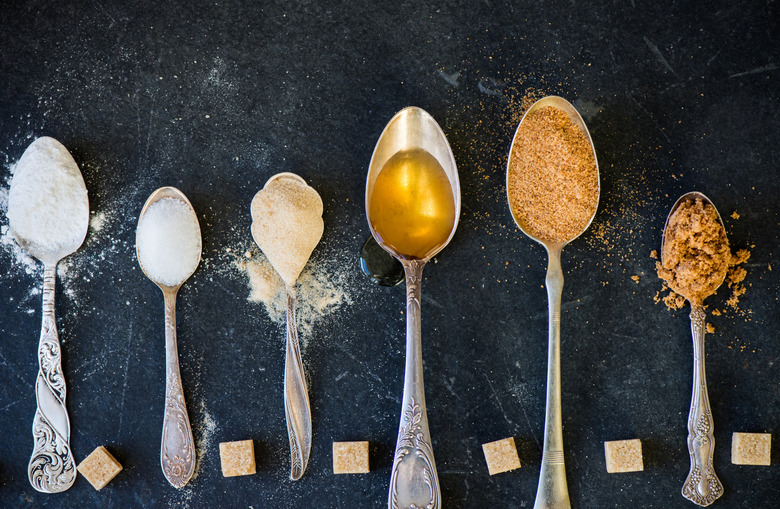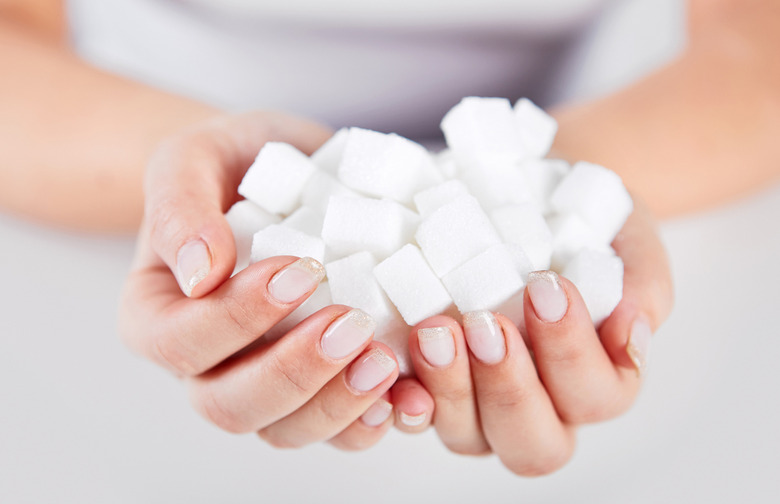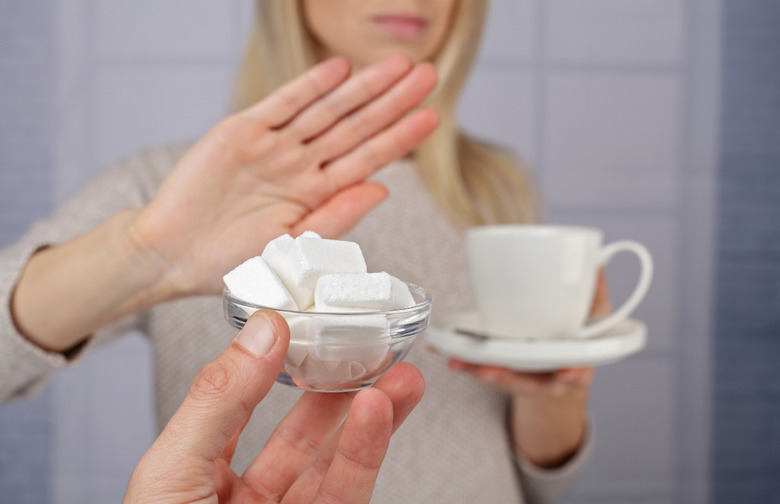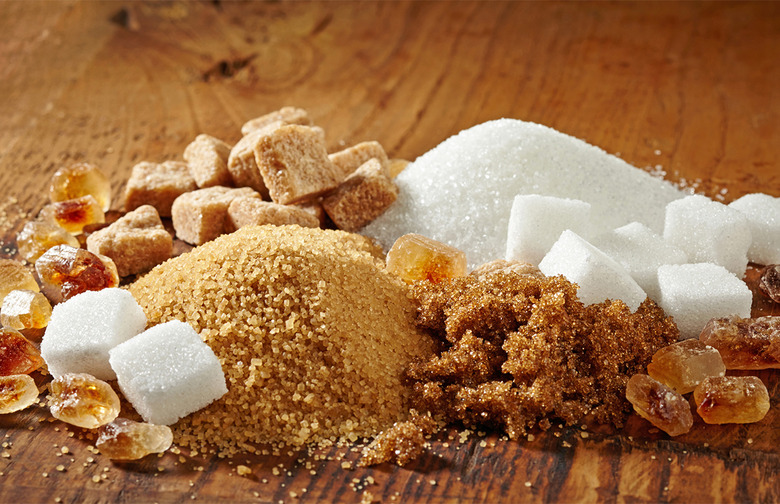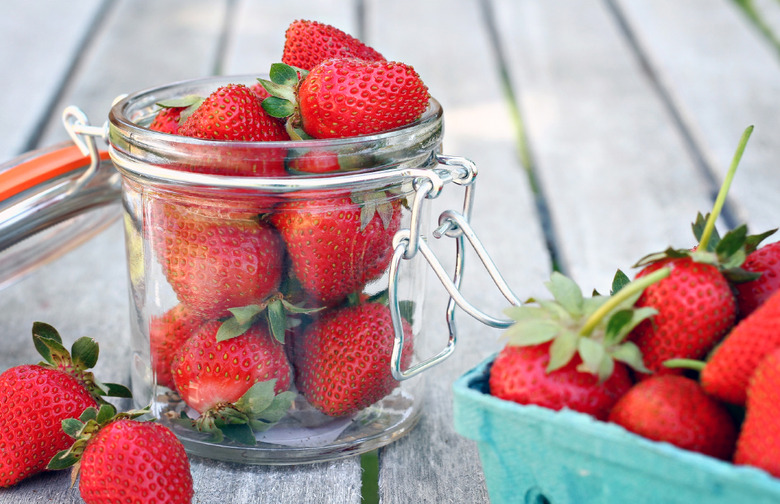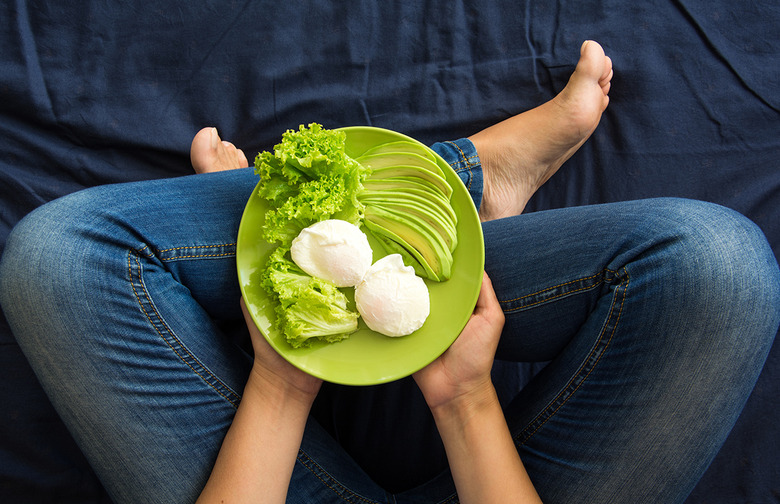Is It Ever OK To Eat Sugar? Nutritionists Weigh In Slideshow
The nationwide understanding about sugar is pretty much unanimous: Sugar is bad. We also tend to believe that evil, deceptive food companies are sneaking sugar into meals, snacks, beverages, and everything in between. Ketchup has sugar. Tomato sauce is thick with it. Pizza is basically dessert food now — in our eyes, at least. Americans are becoming more sugar-savvy, but we still struggle to comprehend whether or not we should be cutting the substance out.
Sugar is blamed for virtually every health problem you can think of — heart disease, cancer, diabetes, indigestion... The list keeps growing and our fears of sugar grow, too. Yet our sugar cravings don't stop. In attempts to control the raving cravings we have for sweets, many have embarked on trying to "detox" themselves from sugar. Cleanses and resets have become increasingly popular, encouraging people to cut out sugar from their diets entirely to discover where the compound was hiding in their everyday food choices.
But according to the nutritionists we queried, that might not be the best call. We asked the professionals whether it is ever OK to eat sugar, and this is what they had to say.
Americans Eat Too Much Sugar
Nutritionists do want us to know that we're eating a ton of added sugar day-to-day. Registered dietitian and author Julieanna Hever reminded The Daily Meal, "According to the World Health Organization (WHO), adults and children should 'reduce their daily intake of free sugars to less than 10 percent of their total energy intake. A further reduction to below 5 percent or roughly 25 grams (6 teaspoons) per day would provide additional health benefits.' Yet, we are consuming almost twice as much as that in the United States."
What does 6 teaspoons of sugar look like? Well, it would take 53 M&M's, a little over half a can of soda, or two glazed donuts to set you over the limit.
Healthful, natural sources of sugar such as dates, apples, dairy products, and honey don't have a recommended limit from the WHO. It's the free sugars — the refined stuff — that's been linked to disease.
Trying to Eliminate Sugar Could Make Things Worse
Worrying about the health effects of sugar, checking the nutrition facts on everything you eat, and slaving over the stove because you're too scared to eat a pre-prepared meal that might sneak some sugar in its recipe are all really stressful habits to keep up with.
If you're eating too much sugar, you can probably tell. You might feel sluggish, have a hard time concentrating at work, or go through irrational mood changes after eating large portions of dessert. But if you're eating a balanced, healthy diet, there's probably no need to worry.
"The stress of eliminating all types of sugar (both natural sugars found in fruit and added sugars), can wreck more havoc on your body than thoroughly enjoying a delicious treat every once in a while," nutritionist Chelsey Amer told The Daily Meal. Amer tells her clients to be mindful of their intake, but not to sweat it if they're craving dessert.
Sugar Is Not Addictive
The dreaded "sugar addiction" has been part of health conversation for some time. Articles and other sources have been claiming that, since sugar releases dopamine when consumed, it's similarly addictive as cocaine or heroin. Both of these drugs also release dopamine, it's true — but they're so forcefully addictive due to their other effects, like intense physical withdrawal. You won't start having night terrors if you quit sugar — but you might if you quit heroin.
Additionally, not everything that releases dopamine is addictive. Simple actions like giving a hug, eating a healthy dinner, and even smiling also release dopamine into your system.
On the other hand, when you cut out sugar and categorize it as an "off-limits" food, you're psychologically prone to wanting it even more. We want what we can't have; if you tell yourself you can't have sugar, you're bound to crave it in large amounts.
Not All Sugars Are the Same
Eating an apple and eating three Jolly Ranchers aren't going to have the same effect on your body — though they do have the same amount of sugar.
The sugars that, as Hever says, "have been linked to depression, anxiety, and tooth and gum decay," are the added kinds.
"The American Heart Association recommends limiting added sugars," Lauren Harris-Pincus, MS, RDN, clarified for The Daily Meal. "Not the kind found in fruit, veggies, or plain dairy."
Lots of Healthy Foods Have Sugar
In fact, many healthy foods have sugar in them, and they're still OK to eat. They're often more than OK — they're beneficial. Fruit is filled with fiber, antioxidants, and natural sugars. Honey has a whole host of health benefits like cancer-fighting power and the ability to help you sleep. Maple syrup, too, has anti-inflammatory properties.
If you cut out these healthy foods from your diet because of the sugar, you'd be missing out.
There are some types of healthy, natural sugar that aren't even that sweet. Carrots, sweet potatoes, milk, and even green peas contain significant amounts of healthy, beneficial sugars.
Sugar and Your Hormones
Have you heard this rumor? According to some health websites, sugar can wreak havoc on your hormones. When you put it that way, it makes it sound like any dosage of sugar will send your emotions and other hormone indicators into chaos.
This is far from the truth. Sugar consumption in itself is intimately tied to your hormone balance. When you eat sugar, your body releases certain hormones to help regulate it in your blood. Insulin is a hormone. So are some of the various compounds that send your brain hunger signals. So when you eat an excess of sugar (or not enough of it), it's definitely going to affect your hormones.
Your body, however, is more than equipped to deal with the sugar you're eating in moderate amounts. Studies have not shown that moderate sugar consumption has any kind of cataclysmic — or even significant — effect on your hormones at all.
Sugar and Your Gut Health
Some gut cleanses have you laying off the sugar — think Whole 30, bone broth cleanses, etc. Others, such as juice cleanses, have you eating sugar and not much else.
So which one is it? Well, the secret isn't in either of those cleanses.
The rumor is that all sugar is harmful to your gut health — but there's not any real evidence to back that up. The studies pointing out sugar's negative effect on gut health only investigate either a) sugar in excess amounts, or b) sugar consumption in the absence of other nutrients. But that's not the way we realistically consume sugar — if you eat it in moderate amounts as part of a nutritious diet, you likely won't experience those negative effects.
On the other hand, artificial sweeteners (which you might use to supplement your sugar cravings after you've cut it out) are harmful to your gut health in any amount. Even just a small dosage of Splenda or another artificial sweetener could alter the bacterial balance of your gut.
Blood Sugar, Explained
The reason excess sugar is considered so bad for you has to do with the way your body reacts to it. Sugar doesn't cause diabetes if you eat it in regular, moderate amounts. Instead, diabetes often develops from a chronic overconsumption — the sort of pattern that you'd likely notice.
When your blood sugar is high, your body releases insulin. The insulin then tells the body's fat cells to absorb the excess glucose to bring blood sugar levels back to normal. When this happens too often, however, the body can become insulin-resistant. Like the boy who cried wolf, the insulin told the body one too many times to deal with its blood sugar — and it stopped being receptive to those signals.
In a nutshell, that's how Type 2 diabetes often develops, and that's why eating too much sugar can be harmful. But again, this is only the case for excessive amounts of sugar. Eating a doughnut every now and again isn't going to kill you.
Eat Sugar, and Do It Mindfully
"It's always OK to eat sugar if it's part of mindful eating, which is when we are able to tune into our body's inner wisdom about hunger and satisfaction," Robyn Nohling, FNP-BC, RD, told The Daily Meal. Intuitive eating is the practice of making food choices from a place of mindfulness rather than external cues like a diet or fear of gaining weight. Intuitive eating, which has been scientifically proven to generate better health outcomes than restricting sugar or other food groups, understands that if you're craving sugar, there's likely a reason. Giving your body what it wants is the best call.
"And even if consuming sugar wasn't a mindful experience, that's OK too because instead, there's an opportunity to learn more about yourself," Nohling concluded.
Never Eating Any Sugar is a Really Bad Idea
"It's not sexy to say, but eating some sugar as part of an overall balanced diet full of vegetables, high-quality sources of protein, and healthy fats is perfectly OK!" Chelsey Amer emphasized. There's no reason to cut out sugar — and doing so can actually hurt your health in the long run.
"Making food a 'never-ever' only leads to cravings, deprivation and misery," registered dietitian Lauren Harris-Pincus told The Daily Meal. Adhering to a strict, no-sugar diet detracts from the freedom and joy of your everyday life — which can have a chronic effect on your physical health in the long run.
Eliminating sugar could directly affect your physical health, too. Never eating any form of sugar could result in nutrient deficiency, since many nutritious foods have naturally-occurring sugars. If you eliminated fruit, for example, you'd be missing out on many essential nutrients. Scientists warn against cutting it out completely.
"If the majority of your diet is comprised of plant-based foods like fruits, veggies, whole grains, nuts, beans and seeds with some lean protein and dairy, that's the goal. There's always room for a little sugar," Harris-Pincus concluded. Getting rid of the completely natural nutrient is a 'healthy' habit that's really not.
